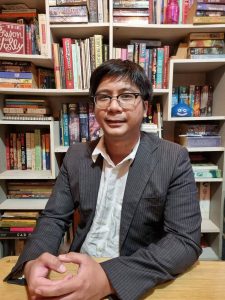スタッフ紹介 / 訪問研究者 / 過去に研究所に在籍した研究者
Carlos Piocos

- 部門・職位
- 社会共生研究部門
招へい外国人学者 - 専門
- cultural studies, Southeast Asia, migration studies
- 研究分野/キーワード
- Southeast Asian cultural studies, mobility studies, labor migration
Carlos Piocos
研究概要
Promising yet Precarious Pathways: Probing Legality and Illegality through Stories, Struggles, and Strategies of Filipino Foreign Trainees and Interns in Japan
I am a literary and cultural studies scholar at De La Salle University. My research interests include critical theory, Southeast Asian studies and migration and diaspora studies. In my previous works, I have delved with issues of mobility, gender, and transnational social movements among Southeast Asian migrant women. I have published widely about Filipino and Indonesian migrant workers’ narratives and struggles in various books, chapters and journals, some of which are available here.
For my project under the Japan Foundation’s Japanese Studies Fellowship grant, I propose to explore the life stories and narratives of struggles of Filipino trainees under Japan’s technical intern training program. I aim to conduct ethnographic interviews that proposes to draw out the life stories, motivations, desires, and aspirations of select Filipino trainees amid the landscape of possible precarious working conditions, uncertain and shifting policies of stay and expansion of the internship program, which has been largely criticized as the Japan’s side door for recruiting ‘foreign workers’ to address its domestic crises of labor shortage and aging population. The project will hopefully enrich the existing empirical researches on precarious and flexible labor arrangements and the rapidly changing migration regimes in Asia.
For my project under the Japan Foundation’s Japanese Studies Fellowship grant, I propose to explore the life stories and narratives of struggles of Filipino trainees under Japan’s technical intern training program. I aim to conduct ethnographic interviews that proposes to draw out the life stories, motivations, desires, and aspirations of select Filipino trainees amid the landscape of possible precarious working conditions, uncertain and shifting policies of stay and expansion of the internship program, which has been largely criticized as the Japan’s side door for recruiting ‘foreign workers’ to address its domestic crises of labor shortage and aging population. The project will hopefully enrich the existing empirical researches on precarious and flexible labor arrangements and the rapidly changing migration regimes in Asia.